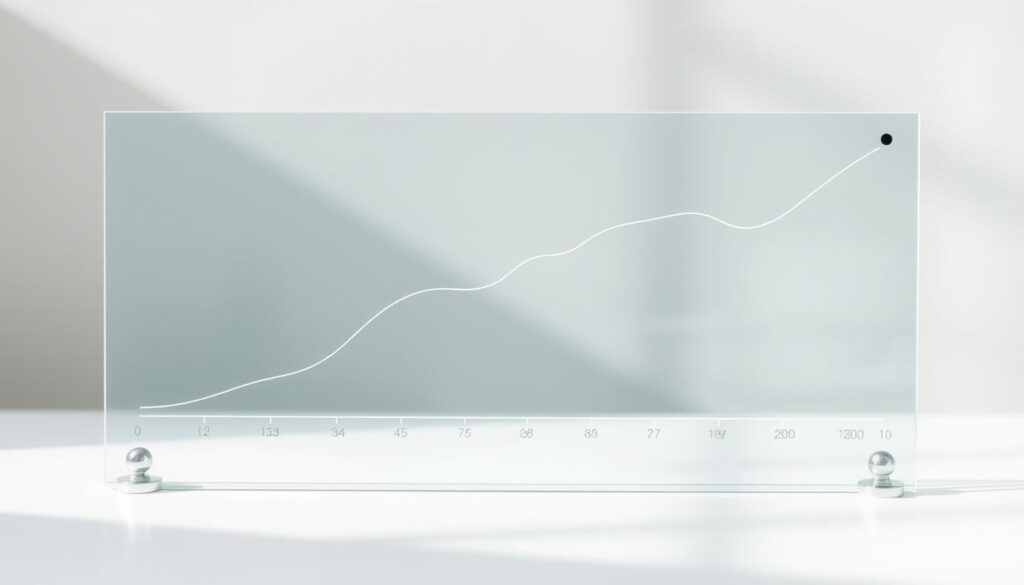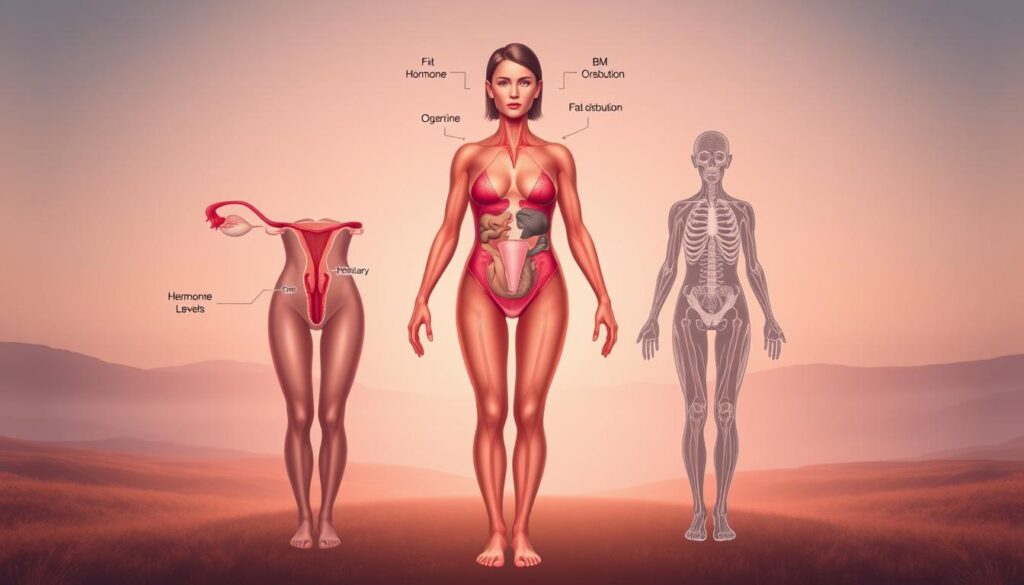When women go through menopause, their bodies change a lot. But is BMI still a good way to measure health during this time?
Studies show that BMI might not be right for post-menopausal women. This is because their body fat changes. More fat goes to the belly area, raising health risks, even if BMI looks okay.
We’ll look into why BMI isn’t perfect for measuring obesity in menopause. We’ll also talk about how we need to rethink what’s considered a healthy weight during this time.
Key Takeaways
- Menopause brings significant changes in body composition.
- BMI may not accurately reflect health risks during menopause.
- Hormonal changes affect body fat distribution.
- Alternative measures may be needed to assess health risks.
- Understanding these changes is crucial for effective weight management.
Understanding BMI and Its Importance
Menopause changes the body in many ways. Knowing about BMI helps us deal with these changes. BMI, or Body Mass Index, is a simple way to check body fat based on height and weight.
What is BMI?
BMI is a common tool to sort people into weight groups. These groups are underweight, normal weight, overweight, and obese. It’s a first step for doctors to talk about health risks linked to weight.
How BMI is Calculated
To find BMI, divide your weight in kilograms by your height in meters squared (kg/m^2). For example, if you weigh 65 kilograms and are 1.65 meters tall, your BMI is 65 / (1.65)^2 = 23.9.
Here’s a simple example to illustrate this calculation:
| Weight (kg) | Height (m) | BMI Calculation | BMI |
|---|---|---|---|
| 65 | 1.65 | 65 / (1.65)^2 | 23.9 |
Why BMI Matters During Menopause
During menopause, women’s bodies change a lot. Hormonal shifts can make fat build up around the belly. Keeping an eye on BMI helps understand these changes and manage weight to lower health risks.
Maintaining a healthy BMI during menopause is key. It helps avoid chronic diseases like diabetes and heart disease. It’s not just about the number on the scale. It’s about staying healthy and feeling good.
The Impact of Menopause on Body Composition
Menopause changes a woman’s body in many ways. It affects her health and how her body looks. As women go through menopause, their bodies go through big changes.
Hormonal Changes and Weight Distribution
Hormones change a lot during menopause. The drop in estrogen can make fat move to the belly. This is known as “menopause belly fat.”
The Role of Muscle Mass and Fat
Menopause leads to more fat and less muscle. This change affects how we look and our metabolism. It makes it harder to keep weight off.
| Factor | Change During Menopause | Impact on Body Composition |
|---|---|---|
| Estrogen Levels | Decrease | Redistribution of fat, increased abdominal fat |
| Muscle Mass | Decrease | Reduced metabolic rate, increased fat mass |
| Fat Mass | Increase | Weight gain, changes in body shape |
Psychological Factors Influencing BMI
Stress and mood swings can affect how we eat and move. This can change our BMI during menopause. To find menopause weight gain solutions, we need to look at the whole picture.
Adjusting BMI During Menopause
Menopause changes a woman’s body a lot. It’s important to check and adjust BMI during this time. Women often gain fat around their belly and lose muscle. Keeping a healthy BMI helps avoid health problems linked to menopause.
Recommended BMI Ranges for Women
A healthy BMI is between 18.5 and 24.9. For women in menopause, staying in this range can lower health risks. BMI is just one health indicator. Body composition and overall health are also key.
Strategies for Achieving Ideal BMI
To reach and keep a good BMI in menopause, you need to eat right, exercise, and make lifestyle changes. Eat a balanced diet with lots of fruits, veggies, whole grains, and lean proteins. Exercise, like walking or swimming, helps with weight and health.
- Eat a balanced diet with plenty of fruits, vegetables, and whole grains.
- Engage in regular physical activity, such as walking, cycling, or swimming.
- Incorporate strength training exercises to maintain muscle mass.
- Stay hydrated by drinking plenty of water throughout the day.
Importance of Consulting Healthcare Professionals
Talking to healthcare professionals is key for managing BMI in menopause. They give advice tailored to your health needs. They can also help with safe weight loss plans, considering any health issues.
Working with healthcare providers and making smart lifestyle choices helps women deal with menopause. This approach improves health and quality of life during this big change.
Nutrition: A Key Factor in BMI Adjustments
During menopause, a good diet is key to managing weight. As women get older, their body needs change. Eating right helps keep a healthy weight and feel good overall.
Essential Nutrients for Menopausal Women
Menopausal women need a diet full of important nutrients. Calcium and vitamin D are vital for strong bones. Omega-3 fatty acids are good for the heart. Also, eating fiber-rich foods like fruits and whole grains helps with weight and digestion.
Enough protein is also important. It helps keep muscles strong, which boosts metabolism. Good protein sources include lean meats, fish, eggs, and plant-based options like beans and lentils.
| Nutrient | Food Sources | Benefits |
|---|---|---|
| Calcium | Dairy products, leafy greens, fortified plant-based milk | Supports bone health |
| Omega-3 Fatty Acids | Fatty fish, nuts, seeds | Promotes heart health |
| Fiber | Fruits, vegetables, whole grains | Aids in weight management and digestion |
| Protein | Lean meats, fish, eggs, dairy, beans, lentils | Maintains muscle mass and boosts metabolism |
Sample Meal Plans for Healthy Weight Management
Creating a meal plan that’s both healthy and tasty is important. Here’s a sample meal plan:
- Breakfast: Oatmeal with fruits and nuts, with low-fat milk or yogurt.
- Lunch: Grilled chicken or fish with veggies and quinoa.
- Snack: Fresh fruits or carrot sticks with hummus.
- Dinner: Lean beef or tofu with roasted veggies and brown rice.
Eating a variety of foods and watching portion sizes helps manage weight and health.
The Role of Hydration in Weight Control
Drinking enough water is key for weight control and health. It helps control hunger and boosts metabolism. Aim for at least eight glasses of water a day, more if you’re active.
Try to avoid sugary drinks and caffeine, which can dehydrate you. Instead, drink water, herbal teas, or low-fat milk for better hydration and weight management.
Exercise and Its Role in Managing BMI
Menopause can change how our bodies look, making exercise key for keeping a healthy BMI. As women go through this time, adding physical activity to their daily life is crucial. It helps keep a healthy BMI and boosts overall health.
Benefits of Regular Physical Activity
Exercise is great for menopausal women, helping with weight, bones, and heart health. It also lowers the risk of diseases like osteoporosis and heart disease.
- Weight Management: Exercise helps keep a healthy weight, lowering obesity risks.
- Improved Bone Density: Exercises that make you work against gravity can fight bone loss.
- Enhanced Cardiovascular Health: Regular activity makes your heart stronger, cutting down heart disease risks.
Types of Exercises for Menopausal Women
A good exercise plan for menopausal women should mix aerobic, strength, and flexibility exercises.
- Aerobic Exercises: Activities like brisk walking, cycling, and swimming boost heart health.
- Strength Training: Resistance exercises build muscle, which can decrease during menopause.
- Flexibility Exercises: Yoga and Pilates improve flexibility and lower injury risks.
Creating a Balanced Workout Routine
To get a balanced workout, menopausal women should mix different exercises in their weekly plan. Here’s a sample routine:
| Day | Exercise Type | Duration |
|---|---|---|
| Monday | Aerobic Exercise (Brisk Walking) | 30 minutes |
| Tuesday | Strength Training (Resistance Bands) | 45 minutes |
| Wednesday | Flexibility Exercises (Yoga) | 60 minutes |
| Thursday | Aerobic Exercise (Cycling) | 30 minutes |
| Friday | Strength Training (Weightlifting) | 45 minutes |
By mixing these exercises and making the routine fit your needs and health, menopausal women can manage their BMI well. This improves their overall health.
Lifestyle Changes to Support BMI Adjustments
Menopause brings many changes that can affect our weight and body shape. Making lifestyle changes can help us adjust our BMI. These changes can make a big difference.
Importance of Sleep for Weight Management
Sleep is key for managing weight. Lack of sleep can mess with hormones that control hunger. This can lead to eating more calories. Aim for 7-8 hours of quality sleep per night to help with weight and health.
Creating a bedtime routine can improve sleep. Try reading, meditation, or a warm bath before bed. Also, make your bedroom cool and dark to sleep better.
Stress Management Techniques
Stress can make it harder to manage weight by increasing cortisol, a fat-storing hormone. Engaging in stress-reducing activities like yoga or meditation can help. These activities can reduce stress and its effects on weight.
- Practice mindfulness through meditation or mindful eating.
- Engage in physical activities that you enjoy, such as walking or swimming.
- Connect with friends and family to build a support network.
Mindfulness and Its Impact on Eating
Mindfulness can change how we eat by making us more aware of hunger and fullness. Mindful eating involves paying attention to the taste, texture, and smell of food. This can make eating more enjoyable and help us eat less.
To eat mindfully, eat slowly and savor your food. Try to avoid distractions like TV or phones during meals. This can help you have a healthier relationship with food and support your weight goals.
Monitoring and Tracking BMI Changes
Tracking BMI changes during menopause is key for weight management. Regularly checking BMI helps keep a healthy weight. This is very important during this life phase.
Using Tools and Apps for Tracking
Today, many tools and apps help track BMI. They calculate BMI and track weight, body fat, and more. Some top choices are:
- MyFitnessPal
- Fitbit
- MyNetDiary
These apps let you log food, exercise, and weight. They give a full view of your health and progress.
Setting Realistic Goals
Setting realistic BMI goals is vital during menopause. Unrealistic goals can cause frustration. It’s important to:
- Get advice from healthcare professionals on a healthy BMI range.
- Set specific, reachable goals, like losing 1-2 pounds a week.
- Check and adjust goals as needed.
How to Interpret BMI Changes Over Time
Understanding BMI changes is crucial for health decisions. A lower BMI means weight loss, while a higher one means gain. But, remember to consider muscle and body composition too.
For example, losing muscle but gaining fat might keep your BMI the same. Yet, your body composition is changing. So, look at trends over time, not just one number.
By monitoring and tracking BMI changes, women can handle menopause better. This helps keep a healthy weight. It supports overall health and well-being during this big life change.
Support Systems and Resources
Dealing with menopause can be tough, but having a strong support system helps a lot. It’s not just about eating right or exercising. It’s also about the people and resources around us.
Finding Community Support
Connecting with others who face similar challenges is very helpful. It offers emotional support and practical advice. Joining menopause support groups online or in-person is a good idea. It lets us share our stories and learn from others.
Professional Resources: Dietitians and Trainers
Working with experts like registered dietitians and personal trainers is beneficial. They give us personalized advice that fits our needs. They help us find effective ways to lose weight and keep a healthy BMI. Using these resources helps us take charge of our health during this big change.




